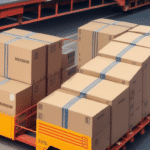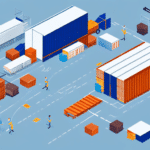Navigating Logistical Challenges in the Modern Business World
Running a successful business today often involves navigating numerous logistical challenges. From managing supply chain operations to dealing with last-mile delivery hurdles, logistics can be a major impediment to success. In this article, we will explore the various challenges that businesses face in logistics and the strategies that can be employed to overcome them.
The Evolution of Logistics and the Impact of Globalization
Historical Development of Logistics
Logistics has evolved significantly from the days of horse-drawn carriages to today's highly sophisticated networks. Originally focused on the simple movement of goods, modern logistics encompasses comprehensive supply chain management solutions that track products from suppliers to end customers, involving numerous intermediaries.
Globalization and Its Effects
Globalization has increased the complexity of logistics by requiring businesses to manage suppliers, distributors, and customers worldwide. This expansion introduces challenges such as varying regulatory requirements and compliance standards. Additionally, businesses must adapt to different cultural norms and business practices, which can affect logistics operations.
For more insights on globalization's impact on logistics, refer to the ShipScience Global Logistics Report.
Common Logistical Challenges Faced by Businesses
Ensuring Timely Delivery
Customers today expect prompt delivery of their orders. Delays can lead to dissatisfaction and loss of business. According to a 2023 survey by ShipScience, 78% of customers consider timely delivery crucial to their purchasing decisions.
Inventory Management
Balancing inventory levels to meet customer demand while avoiding excess stock is a persistent challenge. Implementing robust inventory management systems can help businesses optimize their stock levels.
Transportation Costs and Reliability
High transportation costs and finding reliable carriers are significant hurdles. Furthermore, businesses must consider the environmental impact of transportation and strive to reduce their carbon footprint.
Technological Integration
While technology offers opportunities to streamline logistics, integrating and maintaining new systems can be costly and complex. Staying updated with technological advancements is essential for maintaining competitiveness.
The Role of Technology and Innovations in Logistics
Advanced Warehouse Management Systems
Real-time warehouse management systems enable businesses to monitor inventory levels, track deliveries, and optimize transport routes efficiently. These systems enhance supply chain transparency, allowing for the identification of bottlenecks and informed decision-making.
Autonomous Vehicles and Drones
Self-driving trucks and delivery drones are revolutionizing transportation by operating 24/7, reducing delivery times and costs, and improving safety. Companies like Amazon and UPS are actively testing these technologies to enhance their logistics operations.
Predictive Analytics
Predictive analytics leverages historical data and market trends to forecast demand and optimize inventory levels. This reduces waste and minimizes the risk of stockouts, ensuring products are available when customers need them.
Strategies for Effective Supply Chain Management
Enhancing Supply Chain Visibility
Increasing visibility through real-time tracking helps businesses monitor their supply chain operations effectively. This includes tracking shipments, monitoring supplier performance, and managing inventory in real time.
Optimizing Inventory Levels
Using data analytics and forecasting tools enables businesses to maintain optimal inventory levels, balancing the need to meet customer demand with the goal of minimizing excess stock.
Sustainable Supply Chain Practices
Implementing sustainable practices, such as reducing waste and minimizing carbon emissions, not only benefits the environment but also improves a company's reputation. Ethical sourcing and green logistics are becoming standard practices for socially conscious consumers.
Strengthening Supplier Relationships
Building strong relationships with suppliers ensures reliability and can lead to better negotiation terms and collaboration on sustainability initiatives.
Risk Management and Uncertainty in Logistics
Identifying and Mitigating Supply Chain Risks
Businesses must adopt proactive risk management strategies to handle potential disruptions, such as natural disasters, political instability, or unexpected demand changes. Diversifying the supplier base and investing in resilient infrastructure are critical measures.
Contingency Planning
Developing contingency plans and alternative sourcing strategies helps businesses respond swiftly to unforeseen events, minimizing the impact on operations and customer satisfaction.
Employee Training and Communication
Ensuring that all stakeholders are aware of potential risks and the appropriate response measures is essential. Regular training and effective communication channels can enhance operational resilience.
Improving Sustainability in Logistics Operations
Adopting Green Transportation Solutions
Using electric vehicles and optimizing transportation routes can significantly reduce a business's carbon footprint. Companies are increasingly investing in sustainable transport options to meet environmental goals and consumer expectations.
Reducing Packaging Waste
Minimizing packaging materials and using recyclable or biodegradable options help reduce waste. Efficient packaging design also contributes to lower transportation costs by maximizing space utilization.
Energy-Efficient Warehousing
Implementing energy-efficient systems in warehouses, such as LED lighting and smart HVAC systems, can lower energy consumption and operational costs.
Future Trends and Predictions in Logistics
Integration of Robotics and AI
Robotics and artificial intelligence are set to play a pivotal role in the future of logistics. Automation in warehousing and predictive analytics will enhance efficiency and accuracy in operations.
Blockchain Technology
Blockchain offers enhanced transparency and security in the supply chain by providing immutable records of transactions and shipments. This technology can streamline processes and reduce fraud.
Internet of Things (IoT)
The IoT enables real-time tracking and monitoring of goods, improving visibility and enabling proactive management of supply chain operations.
Sustainable Logistics Practices
As environmental concerns grow, the logistics industry will continue to adopt sustainable practices, including the use of renewable energy sources and the development of eco-friendly transportation solutions.
Overall, navigating logistical challenges in the modern business world is a complex but essential aspect of operations. By understanding these challenges and adopting appropriate strategies, businesses can optimize their logistics, improve efficiencies, and enhance customer satisfaction.




















